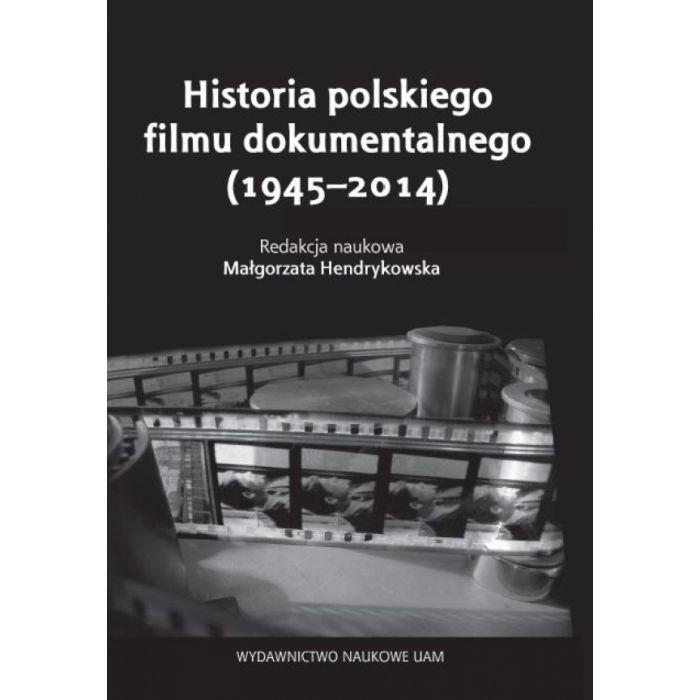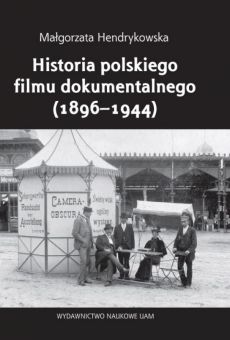Historia polskiego filmu dokumentalnego (1945–2014)
- In Stock: in stock
- ISBN: 978-83-232-2806-6
- Category: Film Studies
- Year of publication: 2015
NAGRODA w 9. edycji Nagród Polskiego Instytutu Sztuki Filmowej w kategorii: książka o tematyce filmowej
Nagroda Rektora Uniwersytetu Warszawskiego dla Najlepszej Publikacji Akademickiej w Dziedzinie Nauk Społecznych i Humanistycznych w Konkursie ACADEMIA 2016, X Targi Książki Akademickiej i Naukowej ACADEMIA 2016
Nagroda Dziennikarzy, 19. Poznańskie Dni Książki nie tylko naukowej
Dwutomowa publikacja jest przedsięwzięciem ogromnym, ambitnym i niezwykle potrzebnym. Dość powiedzieć, że nie ma dotychczas w naszej literaturze przedmiotu syntezy historycznej dziejów polskiego filmu dokumentalnego.
dr hab. Tadeusz Szczepański, prof. UWr
Tom zbiorowy pod red. Małgorzaty Hendrykowskiej obejmuje lata 1945–2014. Autorami opracowań są: Marek Hendrykowski, Andrzej Szpulak, Wojciech Otto, Mikołaj Jazdon oraz Piotr Pławuszewski, Jadwiga Hučková, Mirosław Przylipiak, Katarzyna Mąka-Malatyńska, Krzysztof Kozłowski, Justyna Czaja i Anna Śliwińska. Historia powojennego polskiego filmu dokumentalnego przedstawiona jest z podziałem na dekady, których granice często pokrywały się z istotnymi przemianami politycznymi i społecznymi. Autorzy bardzo przekonująco pokazują też ewolucję języka dokumentu. W jaki sposób wpłynęła na ten przekaz telewizja, jakie były konsekwencje łączenia dokumentu z inscenizacją, fabułą, wreszcie – jak na dokument wpłynęła „rewolucja cyfrowa”.
This is the first historical study on the history of Polish films that presents all of the achievements of Polish documentary cinema from 1945 to 2014, i.e. from the first post-war experiments in documentary filmmaking, the socialist realist ideological offensive and the beginning of the Khrushchev Thaw to the modem digital revolution. The authors present an overview of the most important phenomena and trends of each decade by using a wealth of literature on the subject. Their intention was to show, in a chronological order, the impressive achievements of Polish documentary cinema not only in aesthetic terms but also in the context of politics and through the prism of social and cultural changes, which were often portrayed in documentary films in the most comprehensive and interesting manner. Many of the chapters of this book present the outstanding personalities who co-created Polish documentary film art. The authors also show how Polish documentary film language evolved, i.e. how it was influenced by television (until a certain point in time), which was the main recipient of documentaries, and what the consequences of combining documentary elements with dramatic narrative techniques, i.e. fictional stories, were as well as what impact the digital revolution had on documentary film language. The volume closes with reflections on the Polish School of Documentary Cinema, which is marked by an authorial character of narration and a tendency toward creating a metaphorical picture of the world as well as toward formal inquiry, and on young documentary filmmakers' attitude to tradition, especially with regard to the need for combining this kind of artistic activity with modern market requirements.
| Detailed information | |
|---|---|
| Spis treści |
Download file

|
| Wstęp |
Download file

|
|
|
|
| Publication Version | printed |
| Format | 17,0 x 24,0 |
| Title (EN) | History of Polish Documentary Films (1945–2014) |
| Type of publication | Monografia |
| Edition | I (dodruk 2018) |
| Series | Filmoznawcza nr 14 |
| ISSN | 1642-8595 |
| ISBN | 978-83-232-2806-6 |
| Number of pages | 776 |
| Number of publishing sheets | 56,00 |
| Type of binding | hardcover |

